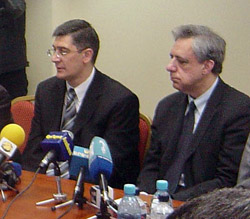Today, in Armenian reality, there is a school where the deputy minister, the journalist, the political figure and even the cartoonist can interact, refrain from making offensive remarks, work and even sing, dance and become friends regardless of political orientation.
Yerevan School for Lessons in Politics (YSLP)-this school has only been around for a year, but it has already established itself and has turned into a serious, institutional center for people who already hold high positions, have a high reputation and who never thought that they would need to study at a school like this.
“The journalist from “A1+” and the representative of the Armenian National Television and Radio board study here. Despite the disagreements between them, the two came to terms thanks to the school,” says director of YSLP and well-known journalist Armen Zakaryan.
According to Zakaryan, the school has two functions: “First, it unites youth involved in politics and secondly, it teaches non-academic, practical and applicable politics,” says A. Zakaryan.
The school has branches in twelve cities of Armenia. In fact, many political figures of Armenia have studied at the Moscow political school and hold rather high positions in Armenia, including Shavarsh Kocharyan, Suren Zulyan, etc. Each school has its own program. The Armenian political school has four seminars.
“The seminars are usually held outside Yerevan. Participants spend a week together studying and preparing speeches. The socialization issue is solved through the means of this bonding,” says A. Zakaryan. The first to enroll as students at the school were some authority figures, the opposition, representatives of the Central Electoral Commission, the President of Armenia, parliamentarians, representatives from the Constitutional Court, ministerial administrations, the Holy See of Etchmiadzin, average and well-known journalists and scientists.
“This school gives an opportunity to gather and unite intellectuality within a couple of years,” says A. Zakaryan.
Throughout the past year, the school has accomplished the following: seminars, homework, debates, practical solutions to a variety of political issues, etc. The topics chosen for discussion are directly tied to the current political situation in Armenia; practical, political issues with the titles “Armenia’s role in the world going through globalization”, “The meaning of Armenia’s democratic developments”, “Armenia’s Euro-integration process” and other essential topics.
“I saw that there was a group of people who were actually concerned about Armenia’s future,” said U.S. Ambassador to Armenia John Evans, who had the chance to read lectures for the students of the political school with the theme “The future of the U.S. and Armenia”. Professors from the universities of Sorbon, Paris, the U.S. and Hamburg, European Council representatives, ambassadors, as well as Armenian authority figures like the President of the Central Bank of Armenia, Chairman of the National Assembly, Head of the Constitutional Court, Ombudsman of Armenia and others have also read lectures at the school.
YSLP in Strasburg on July 10-14
The final results of the school’s institutional program are summarized in Strasburg with the 12 graduates of the school, who also take part in the summer seminar entitled “Summer School for lessons in Democracy”.
“For the first time, all schools are going to meet in Strasburg. Until now, each school came to Strasburg alone. This will be the first time that the Yerevan school meets in Strasburg. We’re not experienced, but we have prepared well for the seminar. We’ve prepared a short film about our accomplishments in Armenia, which will be shown in Strasburg,” says A. Zakaryan.
During the seminar, Chief Secretary of the European Council Terri Davis, Prime Minister of Bulgaria, former President of Slovenia, former Minister of Foreign Affaris of Romania, Nobel Peace Prize winner John Hyum and other well-known people will make their speeches.
“This will give our students the opportunity to communicate with the students of the other eleven schools, establish ties and exchange ideas. I must say that this is a try to establish democracy in Eastern Europe and for that I thank the European Council for organizing this kind of pan-European event,” says director of the school A. Zakaryan.
Besides that, each school will have its separate discussion on the topics chosen beforehand. The Yerevan school will discuss two topics with the schools of Bucharest and Sofia.
The doors of this exclusive school in Armenia are open for anyone who thinks politically, can analyze and be logical. Georgia was the first in the Southern Caucasus region to open a school like this nine years ago. After the Yerevan school established itself, Azerbaijan also applied to the European Council with the prupose of creating a similar school in Azerbaijan.

